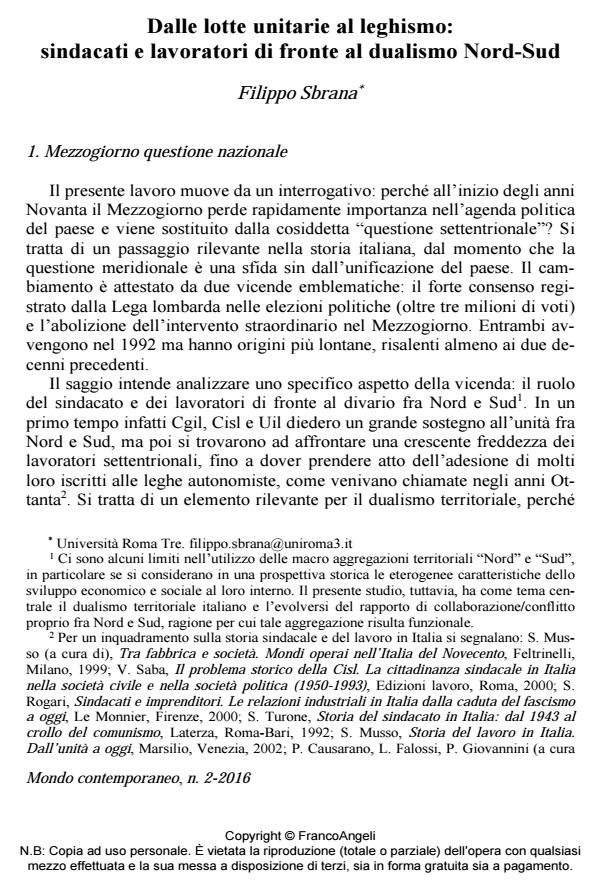From unitary struggle to «leghismo»: trade unions and workers facing the North- South dualism
Journal title MONDO CONTEMPORANEO
Author/s Filippo Sbrana
Publishing Year 2016 Issue 2016/2
Language Italian Pages 51 P. 87-137 File size 376 KB
DOI 10.3280/MON2016-002004
DOI is like a bar code for intellectual property: to have more infomation
click here
Below, you can see the article first page
If you want to buy this article in PDF format, you can do it, following the instructions to buy download credits

FrancoAngeli is member of Publishers International Linking Association, Inc (PILA), a not-for-profit association which run the CrossRef service enabling links to and from online scholarly content.
This article analyses the decline of the so-called "Southern Question", for a long time a top priority of Italian governments, at the beginning of the 1990s. This was a structural change, since the development of the South has represented a crucial challenge for Italy since its Unification. The article investigates this topic with an original approach that takes into consideration, in particular the point of view of trade unions through the scrutiny of archival records, newspapers and other primary sources. During the 1970s trade unions had a strong negotiating power and were able to mobilize workers all throughout the country to reach the goal of overcoming the North-South gap. Few years later, however, the economic crisis that followed the oil shock undermined Northern Italy’s support to the whole project, making it impracticable. In the 1980s, while Italy was involved in major domestic and international changes, the interest of Northern workers towards Southern ones further decreased, eventually turning into opposition against them. A lot of trade unions members joined the Lega Lombarda and other Northern populist parties and movements. These events pushed in favour of the end of the "extraordinary intervention for the South", increased the gap between North and South and eventually contributed to the end of the so-called "First Republic".
Il saggio ricostruisce il calo d’interesse verso lo sviluppo del Mezzogiorno, che perde rilevanza nel dibattito pubblico italiano fino ad essere sostituito nei primi anni Novanta dalla cosiddetta "questione settentrionale". È un tema importante, perché il dualismo Nord-Sud è tema centrale per il paese sin dall’unificazione. Viene qui analizzato attraverso un punto di vista finora poco considerato dalla storiografia sull’argomento, quello dei sindacati e dei loro iscritti, utilizzando documenti d’archivio in larga parte inediti e fonti a stampa coeve. All’inizio degli anni Settanta Cgil, Cisl e Uil erano particolarmente forti e mobilitarono i lavoratori dell’intero paese affinché fosse superato il dualismo Nord-Sud. Ma la grave crisi economica seguita allo shock petrolifero indebolì il sostegno del Nord a questo disegno, insieme ad alcuni limiti dell’azione sindacale. Negli anni Ottanta, mentre l’Italia era segnata da profonde trasformazioni collegate anche a processi sovranazionali, l’interesse dei lavoratori settentrionali per il Sud diminuì ancora, fino a trasformarsi in contrapposizione. Molti iscritti ai sindacati sostennero la Liga veneta e la Lega lombarda, che rilanciarono la contrapposizione fra settentrionali e meridionali, spinsero per la cancellazione dell’intervento straordinario nel Mezzogiorno e contribuirono al tramonto della Prima Repubblica, stagione che aveva identificato nella questione meridionale una sfida fondamentale.
Keywords: Italy, Southern Question, depressed areas, North-South gap, trade unions, economic crisis
- Lega Nord: between mistrust of the Church, traditionalist sympathies and neo-pagan alternatives (beginnings) Daniela Saresella, in Journal of Modern Italian Studies /2023 pp.343
DOI: 10.1080/1354571X.2022.2133282 - “Italians First”: Workers on the Right Amidst Old and New Populisms Gilda Zazzara, in International Labor and Working-Class History /2018 pp.101
DOI: 10.1017/S0147547917000370
Filippo Sbrana, Dalle lotte unitarie al leghismo: sindacati e lavoratori di fronte al dualismo Nord-Sud in "MONDO CONTEMPORANEO" 2/2016, pp 87-137, DOI: 10.3280/MON2016-002004